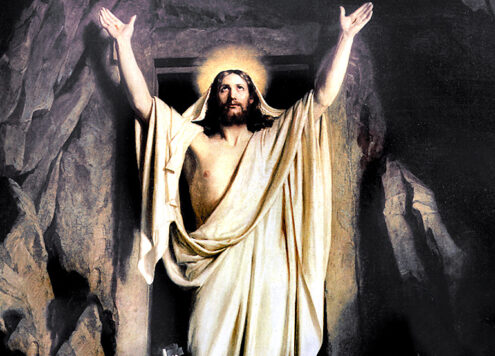In the Gospel of Mark, we find an instance where Jesus retreats into the desert to pray ( Mark 1: 35 ). This act is not an isolated one. Throughout the scriptures, Jesus is depicted turning to prayer at pivotal moments—be it when faced with significant decisions such as selecting his apostles or during times of acute crisis, like the harrowing hours in the Garden of Gethsemane. Prayer was the vital conduit through which He sustained a deep and abiding communion with God the Father.
But what does Jesus’s intimate relationship with the Father in prayer tell us about prayer’s role in our own lives?
The question arises, particularly in an age of rationalism and self-reliance: Why resort to prayer when we possess the cognitive tools to navigate life’s challenges? This perspective, however, overlooks the essence of human existence and the multifaceted nature of our being. Life, in its deepest sense, transcends the boundaries of logic and reason. Author Flannery O’Connor, with her characteristic insight, referred to prayer as a “habit of the heart,” a practice that engages with the profound mysteries of existence that reason alone cannot unravel.
Prayer, then, is an acknowledgment of the limitations of human wisdom and an openness to divine guidance. It engages that part of us that is not satiated by empirical knowledge or logical deduction—the part that seeks connection with the Divine in the quiet recesses of our souls. Our lives are a combination of internal experiences and external actions, and how we navigate our relationship with God internally shapes our interactions with the world.
Scripture vividly illustrates that prayer is our lifeline to God, a channel through which we can express our deepest doubts, fears, and aspirations. Even in moments of profound doubt—exemplified by Jesus’ poignant cry on the Cross, questioning why God had forsaken Him—there lies an implicit trust in God’s will, an ultimate surrender expressed in the words he quotes from Psalm 31: “Into your hands I commend my spirit.”
Jesus’ practice of withdrawing from the world to pray underscores a timeless truth: the necessity of finding balance through solitude and reflection. He didn’t just practice prayer. He advocated for it, offering us the scriptures as a roadmap for our spiritual journey.
The value of setting aside moments of quietude each day cannot be overstated. In the relentless pace of modern life, it is imperative to seek moments of contemplation, to immerse ourselves in the mystery of God’s will by meditating on the scriptures. It is in these moments of stillness that prayer takes root in our hearts, much like a seed in fertile soil, eventually bearing the fruits of peace, wisdom, and clarity in our lives.
The life of Jesus offers us a profound understanding of prayer’s place within life’s journey. Prayer is not an escape from reality but a deeper engagement with it. It enables us to navigate the complexities of life with grace, guided by the wisdom of the Divine. It reminds us that, amidst the cacophony of our daily existence, the quiet habit of prayer can transform our hearts and minds, guiding us towards a path of peace and fulfillment.
—Fr. Hugh Duffy











6 Comments
Nancy E. Head
We have to pursue quiet for prayer time. This world is noisy and such time doesn’t happen by accident.
Tom Walsh
Thank you Fr. Hugh for creating awareness of the need for Prayer Time. For me, I find Prayer Time during the day to be very energising and it helps me to Let Go and Let God instill in my heart and my mind, little nuggets of Peace, Joy and Direction that I may have been seeking through the day, but wanted to solve issues alone, when there was no need to. Take care and God Bless. Tom
Patricia
🙏💝☮️
Bartholomew Okere
Fr. Duffy, the music lyrics summaries the universality of prayer that cut across boundaries & regions. The stillness in prayer has always been my joy whenever I wake up from sleep & begin my day with God in prayer. Loved Ps 31 you quoted- “Into your hands Lord I commend my spirit” & worries & anxiety. Thanx for your ministry that uplifts people’s minds & hearts. Shalom!
Pastor Jared magangi
I learn a lot from our Master jesus,. He used to separate himself for prayers, our great pastors they get powers from jesus through prayers and fasting.
Tom Rooney
Thanks always father Hugh great commentary and appreciated 👏